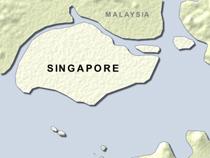-
(单词翻译:双击或拖选)
By Barry Newhouse
Bangkok
07 August 2006
 |
||
----
Singapore officials say five publications, the Far Eastern Economic Review, the International Herald2 Tribune, the Financial Times, Newsweek and Time magazines, must follow the same rules as other foreign publications, if they want to continue publishing in the country by appointing a legal representative in Singapore, and paying a deposit of about $126,000.
In a statement e-mailed to VOA, the press secretary to Singapore's minister for information, communications and the arts said officials revoked3 the five publications' exemptions4 to the rule as part of a policy review.
Foreign publications in Singapore are subject to the Newspapers and Printing Presses Act. The press secretary wrote that the law reinforces the government's position that it is "a privilege, not a right, for foreign newspapers to circulate in Singapore."
The media group Reporters Without Borders has ranked Singapore a low 140th out of 167 countries in its 2005 worldwide press freedom index. It said the loophole closure follows the Far Eastern Economic Review's recent interview with government critic and opposition5 leader Chee Soon Juan.
Senior editor at the Thai daily newspaper The Nation, Kavi Chongkittavorn, agrees that the closure is meant to send a message to the media.
"I think the Singaporean government wants to send a strong message that when a foreign publication wants to write about Singapore, and [is] on sale in Singapore, it's the Singapore government that makes the rules, not the foreign publication," said Kavi.
Roby Alampay of the Southeast Asia Press Alliance says Singapore is also signaling that it will not tolerate protests or reports on protests during the forthcoming summit of the International Monetary6 Fund, to be held in Singapore in September.
Cherian George, a professor of communication at Singapore's Nanyang Technological7 University, says the Newspapers and Printing Presses Act gives the government broad powers, although it has used those powers selectively.
"The law is written in rather sweeping8 terms, so a newspaper can be deemed to be interfering9 in domestic politics," he said. "In practice, though, the government has used this legislation in cases where publications have not given it the unedited right of reply."
News organizations that criticize Singapore's government have faced tough penalties. The government is renowned10 for initiating11 lawsuits12 and blocking advertising13 or circulation to control coverage14 of the city-state. In recent years, the International Herald Tribune and Far Eastern Economic Review have had their circulation cut, or paid steep fines after losing lawsuits in Singapore.
 收听单词发音
收听单词发音
1
stringent

|
|
| adj.严厉的;令人信服的;银根紧的 | |
参考例句: |
|
|
|
2
herald

|
|
| vt.预示...的来临,预告,宣布,欢迎 | |
参考例句: |
|
|
|
3
revoked

|
|
| adj.[法]取消的v.撤销,取消,废除( revoke的过去式和过去分词 ) | |
参考例句: |
|
|
|
4
exemptions

|
|
| n.(义务等的)免除( exemption的名词复数 );免(税);(收入中的)免税额 | |
参考例句: |
|
|
|
5
opposition

|
|
| n.反对,敌对 | |
参考例句: |
|
|
|
6
monetary

|
|
| adj.货币的,钱的;通货的;金融的;财政的 | |
参考例句: |
|
|
|
7
technological

|
|
| adj.技术的;工艺的 | |
参考例句: |
|
|
|
8
sweeping

|
|
| adj.范围广大的,一扫无遗的 | |
参考例句: |
|
|
|
9
interfering

|
|
| adj. 妨碍的 动词interfere的现在分词 | |
参考例句: |
|
|
|
10
renowned

|
|
| adj.著名的,有名望的,声誉鹊起的 | |
参考例句: |
|
|
|
11
initiating

|
|
| v.开始( initiate的现在分词 );传授;发起;接纳新成员 | |
参考例句: |
|
|
|
12
lawsuits

|
|
| n.诉讼( lawsuit的名词复数 ) | |
参考例句: |
|
|
|
13
advertising

|
|
| n.广告业;广告活动 a.广告的;广告业务的 | |
参考例句: |
|
|
|
14
coverage

|
|
| n.报导,保险范围,保险额,范围,覆盖 | |
参考例句: |
|
|
|















